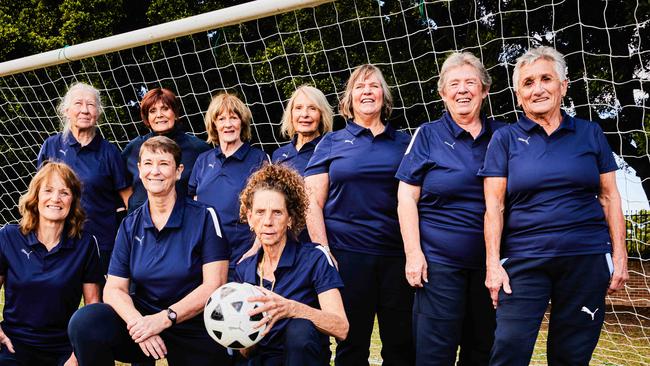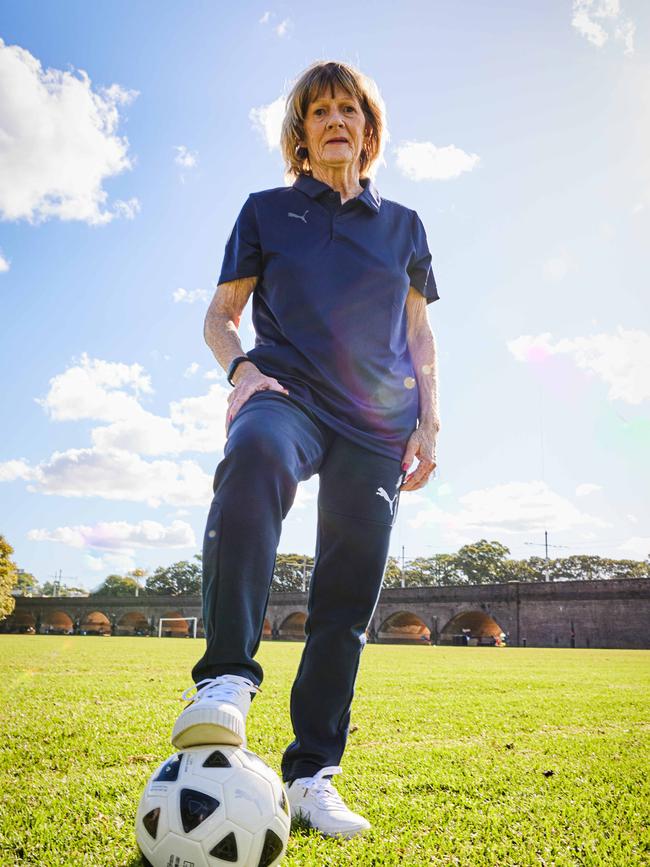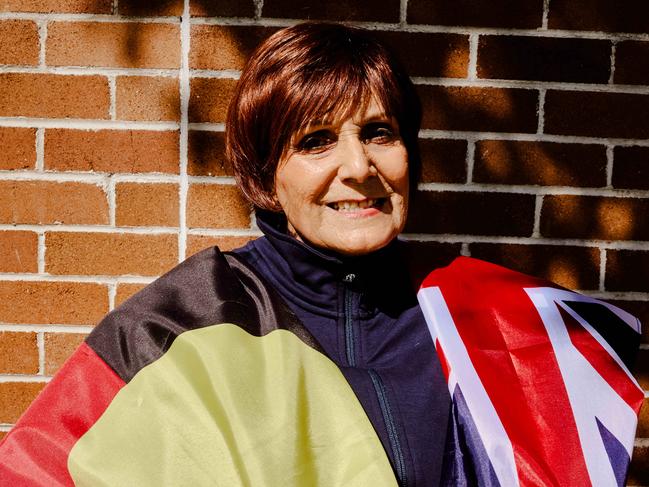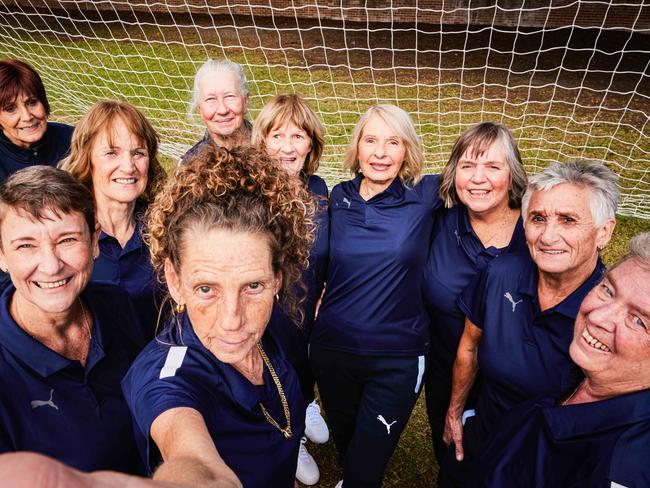Puma to honour Australian female players from the 1975 AFC Championships
One of the world’s leading sports brands is doing what Football Australia refuses to do by paying tribute to the first Australian women’s team to play on the international stage.

NSW
Don't miss out on the headlines from NSW. Followed categories will be added to My News.
These are no longer the “forgotten Matildas”.
A Sunday Telegraph push to recognise the first but forgotten national team of female soccer players has resulted in a partnership and six-figure campaign from sports group Puma.
Today, Puma will announce a groundbreaking agreement after signing players that last represented Australia 48 years ago at the first AFC Women’s Championships, now called the Asian Cup, in 1975.
In joining our acknowledgment of the first national women’s team, Puma is doing what Football Australia refuses to do – pay tribute and acknowledgment to the First Matildas.
Puma’s partnership, timed to coincide with next month’s Women’s World Cup in Australia and New Zealand, will include events and marketing and a contribution to junior development.
The Sunday Telegraph first reported the “green and gold washing” of the 1975 side almost a year ago. But now it can also be revealed the team that finished third in Hong Kong also included the first women’s Indigenous player to represent Australia.
Playing under the pseudonym of Stacey Tracey, Aunty Tarita from the Woppaburra people of Keppel Islands off Central Queensland played all three Australian games.

Today she uses a walking stick, a legacy of an ugly tackle during Australia’s loss to New Zealand.
Often dubbed trailblazers and pioneers, the 1975 Australian team are seeking to officially recognised as the First Matildas.
The current women’s Asian Cup trophy was cast from six solid silver bars, as a tribute to the six competing countries that played in the first tournament. Despite being acknowledged in 5.5kg of sterling silver, Football Australia argue the 1975 games don’t constitute a full “A” international.
Governing body FIFA recognises international caps in A internationals, which includes matches where two confederations are represented. In 1975, this was Oceania and Asia.
While FA acknowledge the historical significance of the side and of the tournament, they also argue there was not a competitive process to select the team.
But the Australian team had been sanctioned and approved by the Australian Soccer Federation – the governing body recognised by FIFA.
The Australian Women’s Soccer Association was responsible for state and national championships but at the same time no team was selected. Consideration for the 1975 tour, paid for by the players themselves, was thrown open to all female players. Those that expressed interest went and proudly played with permission to wear the Coat of Arms on their chest.

Puma will also sponsor players from the 1975 New Zealand team. Puma Oceania general manager Daniel Gutstein said: “We want to highlight the incredible women who helped women’s football get to where it is today”.
“Even in this iconic year both Australia’s and New Zealand’s contribution to female football has resulted in little fanfare and recognition – we want to change that, we want the community to know these names. These women fought against gender stereotypes, societal norms and to this day fight to be recognised.
“They pushed the barriers of sport and made all things possible to the current generation. Sport has the power to make a better world and we want these women to receive the accolades that are due to them. It’s important we all know their names.”
The campaign comes as Football Australia moves to appease the disgruntled group ahead of next month’s Women’s World Cup.
While FA said it “welcomed” the 1975 team into the football family, it has stopped short of acknowledging the side as the First Matildas.
Football Australia CEO James Johnson said: “It is important we celebrate the achievements of those who have contributed so much to our game”.
“With the FIFA Women’s World Cup Australia & New Zealand 2023 fast approaching, we have a unique opportunity to spotlight women’s football in Australia and the impact these players have made.”
But these same players have not been invited to join the Matildas alumni – or attend any matches of the 2023 Women’s World Cup.
Instead, Puma has secured tickets and invited players from the 1975 Australian and New Zealand sides to the Matildas first game against Ireland in Sydney on July 20.

Only three of the 75ers went on to be capped and considered Matildas when they played in the 1979 Australian team – Julie Dolan (No. 1); Kim Coates (No. 5) and Cindy Heydon (No. 6). Coates and Heydon didn’t realise they weren’t capped until a 40th anniversary for the 1979 team in which caps were handed out and they realised their 1975 team had been overlooked.
Heydon said: “They were the pioneers; I was lucky to be in right place at right time. These women started women’s football in Australia … their standards, their culture, and they were so skilful.”
To which Coates added: “We played hard and trained hard. To be honest, that 1975 tournament was a lot tougher than the one-off game against New Zealand in 1979 that we got capped for. Not taking anything away from anyone that played for Australia but the 75ers were the first.”
In another first, Stacey Tracey listed in the program – also known as Aunty Tarita – was the first Indigenous women’s player to wear the green and gold.
“Today I sit proudly here as a Woppaburra woman from the Keppel Islands … I am proud to be Indigenous and I am proud to be Australia,” Aunty Tarita said, choking back emotion. “But in those days, you didn’t ask questions about your heritage. I was working as a security officer and bodyguard so I played under another name and told people I was a Blackfoot Indian … you lie to survive. But today I want to tell people about what we did, this is for my family … I have 25 great grandchildren aged 21 and downwards, this is for them.”
Of that 1975 team, coach Joe O’Connor – husband of striker Pat who scored the first goal for Australia in their 3-2 loss to Thailand at that Asian Cup, Lyn McKenzie and Sue Taylor have passed away.
Pat, 80, said: “They would all be so proud. It would have been nice to be recognised at the time but they are all looking down, and they would be so proud and so would our parents and friends.
“And at long last we get to tell our story.”
Sue Binns added: “My son’s bought me a ticket to the first Matildas game against Ireland. I am just so delighted at how the big the game has become … and to think we started it all. Women’s football had to start somewhere and I believe we were the ones that started it.”
Got a news tip? Email weekendtele@news.com.au




